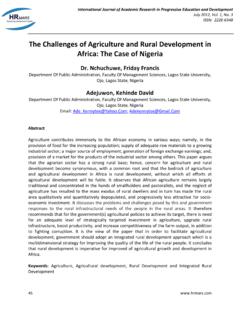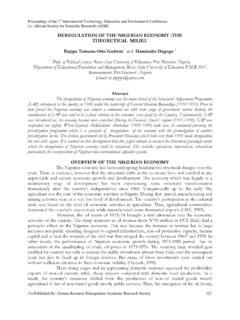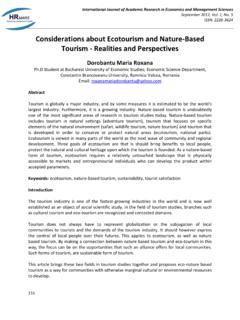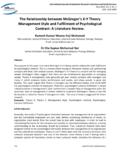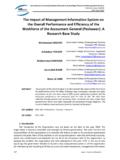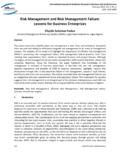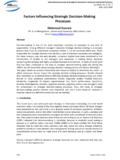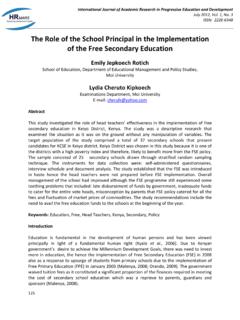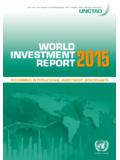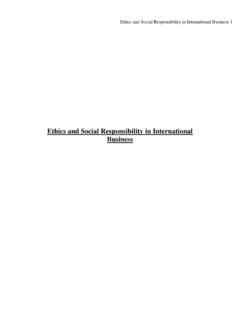Transcription of Multinational Corporations and the Nigerian …
1 International Journal of Academic Research in Business and Social Sciences April 2013, Vol. 3, No. 4 ISSN: 2222-6990 359 Multinational Corporations and the Nigerian Economy Osuagwu, Godwin Onyewuchi Department of Accountancy, Bingham University, Karu, Nasarawa State, Nigeria Email: Ezie Obumneke Department of Economics, Bingham University, Karu, Nasarawa State, Nigeria Email: Abstract The paper seeks to examine the activities of Multinational Corporations (MNCs) in Nigeria and how it has influenced the Nigerian economy. Specifically, it analyses how MNCs has served as agents of imperialism in any economy where they operate. Most economists believe that the MNCs are exploitative as natural resources found in developing countries such as in Nigeria meant for its development are not productively utilized due to de-capitalization of the economy in form of profit repatriation.
2 It argues however that in spite of the negative activities of MNCs however, they contribute positively in the areas of technological development and creation of employment opportunities. The paper sorts out to examine the nature, objective and operations of MNCs in the Nigerian economy. Keywords: Multinationals, Corporations , Effects Introduction Over the years, Multinational Corporations (MNCs) have been a source of controversy ever since the East India Company developed the British taste for tea and a Chinese taste for opium (Stopford, 1998). A typical Multinational corporation (MNC) normally functions with a headquarters that is based in one country, while other facilities are based in locations in other countries. In some circles, a Multinational corporation is referred to as a Multinational enterprise (MNE) or a transnational corporation (TNC) (Tatum, 2010).
3 They enter host countries in different ways and different strategies. Some enter by exporting their products to test the market and to find whether their existing products can gain sizeable market share. For such firms, they rely on export agents. These foreign sales branches or assembly operations are established to save transport costs because there is a limit to what foreign exports can achieve for a firm owing mainly to tariff barriers and quotas and also owing to logistics or cost of transportation. Most of the firms are encouraged by the low wage rates and other environmental factors. To meet the growing demands in the foreign countries, the firm considers other options such as licensing or foreign direct investment which are critical steps. Some continue with export even when they have settled for the FDI option.
4 Every step takes strategic planning and is motivated by profit through sales growth. The idea of Multinational International Journal of Academic Research in Business and Social Sciences April 2013, Vol. 3, No. 4 ISSN: 2222-6990 360 Corporations has been around for centuries but in the second half of the twentieth century Multinational Corporations have become very important enterprises. Tatum (2010) proposes that multinationals operate in different structural models. The first and common model is for the Multinational corporation positioning its executive headquarters in one nation, while production facilities are located in one or more other countries. This model often allows the company to take advantage of benefits of incorporating in a given locality, while also being able to produce goods and services in areas where the cost of production is lower (Ozoigbo and Chukuezi, 2011).
5 The second structural model is for a MNC to base the parent company in one nation and operate subsidiaries in other countries around the world. With this model, just about all the functions of the parent are based in the country of origin. The subsidiaries more or less function independently, outside of a few basic ties to the parent. A third approach to the setup of an MNC involves the establishment of a headquarters in one country that oversees a diverse conglomeration that stretches to many different countries and industries (Tatum 2010; Robinson 1979). With this model, the MNC includes affiliates, subsidiaries and possibly even some facilities that report directly to the headquarters. Such direct investment means the extension of the managerial control across national boundaries (Gilpin, 1987). Rugman et al (1985), who prefer to use the name Multinational enterprises, say that the concept of the MNE is that the difference between Domestic corporation and the MNE is that the latter operates across national boundaries.
6 While institutions are important for economic development, particularly in resource rich countries, the interaction between Multinational Corporations and host country institutions is not well understood (Wiig and Kolstad, 2010). There is a risk that Multinational Corporations facilitate patronage problems in resource rich countries, exacerbating the resource curse. Multinational Corporations (MNCs) in service industries have given this sector's large and growing impact on the global economy (Goerzen and Makino, 2007). The Marxists view the emergence of the Multinational Corporations as a historically progressive aspect of capitalism in the process of developing, at international level (Gilpin 1987; Stopford 1988). In all these views both Marxist and non-Marxist, the common basis is productive activity in more than one social formation.
7 Another point to be noted right away is that in a social formation there may be many multinationals with different nationalities and also many Corporations of the same nationality. In a social formation where there are many MNCs from different nations, there are higher possibilities of conflicts than where they are mainly from the same country. The nature or objective of MNCs is maximization of profit at the lowest possible cost. Actually it is this feature that gave rise to MNCs. So the idea of investing in foreign land is not to better the lot of the host nation but to exploit as much as is possible in order to develop the home country (Ozoigbo and Chukuezi, 2011). Presently Multinational Corporations have dominated discussion on political economy. Activities of the MNCs in Nigeria have generated a repulsive reaction from many economic theorists like (Onimode 1982).
8 Onimode(1982) went ahead to regard MNCs as monsters that have consistently and systematically stultified economic development in various parts of the world. The merits as well as the demerits of the MNCs in Nigeria, the consequences of economic exploitation of MNCs in Nigeria and suggest ways for restitution will be discussed. International Journal of Academic Research in Business and Social Sciences April 2013, Vol. 3, No. 4 ISSN: 2222-6990 361 The rest of the paper is structured as follows after the introduction. Section (II) examines Multinational Corporations (MNCs): Concept and Objective. Section (III) Discusses the Multinational Corporations as Agents of Imperialism. (IV) Discuses the Negative Impact of Multinational Corporations in Nigeria (V) Examines the Positive Effects of Multinational Corporations in Nigeria, while the last section is the conclusion.
9 Multinational Corporations (MNCs): Concept and Objective The term Multinational corporation (MNC) can be defined and described from differing perspectives and on a number of various levels, including law, sociology, history, and strategy as well as from the perspectives of business ethics and society. Multinational Corporations are companies which seek to operate strategically on a global scale. A Multinational corporation is a company, firm or enterprise that operates worldwide with its headquarters in a metropolitan or developed country. Hill (2005) defines Multinational Enterprise as any business that has productive activities in two or more countries. Certain characteristics of Multinational Corporations should be identified at the start since they serve, in part, as their defining features. Often referred to as Multinational enterprises, and in some early documents of the United Nations they are called transnational organizations, Multinational Corporations are usually very large corporate entities that while having their base of operations in one nation the home nation carry out and conduct business in at least one other, but usually many nations, in what are called the host nations.
10 Multinational Corporations are usually very large entities having a global presence and reach (Kim, 2000). Multinational Corporations (MNCs) can spur economic activities in developing countries and provide an opportunity to improve the qualities of life, economic growth, and regional and global commons (Litvin, 2002). According to Gilpin (1987) the principal objective of Multinational Corporations is to secure the least costly production of goods for world markets. This goal may be achieved through acquiring the most efficient locations for production facilities or obtaining taxation concession from host governments. This objective confirms the views of the Marxist who see the MNCs as progressive agents of capitalism. As a result of this capitalist motif, the MNCs try in every way possible to cut down expenses and maximize profit.

